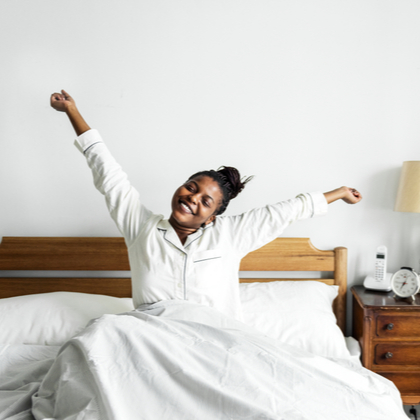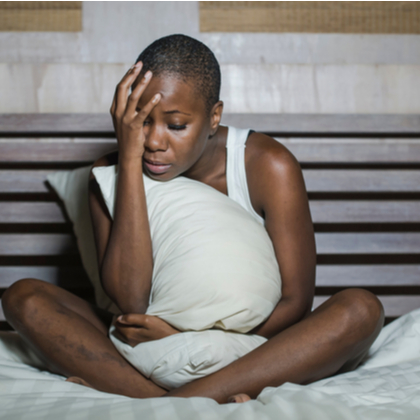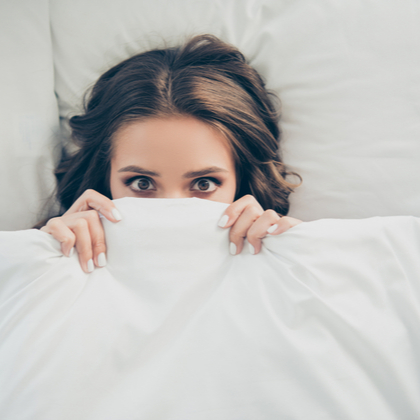
Known for inducing drowsiness and relaxation, alcohol has long been used as a ‘nightcap’ to promote sleep. Yet, despite its initial sedative effects, there’s now extensive and overwhelming evidence to suggest alcohol – particularly when consumed in excess – diminishes sleep quality and duration (1). Alcohol may also increase the risk of sleep disorders like insomnia and sleep apnoea.
Below, we take a look at the intricate relationship between alcohol and sleep, exploring the immediate effects of alcohol on rest and its long-term consequences on sleep quality.
How does alcohol affect sleep?
Alcohol has both a complex and multi-layered impact on sleep. Here are some ways alcohol influences your sleep cycle.
Alcohol causes sleep disturbances
In the first half of the night, when alcohol is still coursing through your bloodstream, you experience quicker sleep onset and an extended duration in deep sleep (commonly referred to as stage three of NREM sleep).
Nevertheless, once your liver enzymes metabolise the alcohol and its sedative effects wear off, your body undergoes a ‘rebound effect,’ meaning you transition from deeper to lighter sleep and experience frequent awakenings and arousals (2).
Although you may not recall these nocturnal disruptions, you’ll have classic ‘hangover’ symptoms in the morning: feeling unfocused, sluggish, and tired.
Alcohol also has a diuretic effect, increasing the passing of urine, which can further disrupt sleep. During sleep, various biological processes – including those involved in your bladder – are put into ‘hibernation’ mode. However, alcohol can interfere with this practical system and prompt wakefulness for bathroom use.
Alcohol fragments sleep architecture
Sleep is regulated by cycles of brain activity, consisting of two primary stages: non-rapid eye movement (NREM) and rapid eye movement (REM). The sleep cycle initiates with NREM sleep followed by a brief burst of REM sleep. In each 90-minute sleep cycle, you progressively experience more REM sleep, totalling five to six cycles each night.
While all stages of the sleep cycle are crucial for restoration, REM sleep – the primary phase for dreaming – is particularly critical, serving as a vital form of emotional convalescence. During this stage, processes affecting mood regulation, mental restoration, cognition, and memory unfold throughout the body, acting as ‘overnight therapy.’
A comprehensive review of 27 studies found alcohol negatively impacts REM sleep (3). Despite helping participants fall asleep faster and enjoy a brief period of deep rest, the findings revealed alcohol reduced overall REM sleep.
Consistently failing to achieve sufficient quality REM sleep can heighten emotional reactivity and lead to poor mental health outcomes, including increased anxiety, stress, and depression (4). This, in turn, may contribute to further sleep disruptions since mental ill health and sleep issues often share a bidirectional relationship.
Alcohol and insomnia
Insomnia, a pervasive sleep disorder in the UK, is earmarked by persistent challenges in falling asleep, maintaining sleep, or waking too early despite ample opportunities for rest.
The relationship between alcohol and insomnia is complicated. Alcohol not only fragments sleep but also diminishes REM sleep, giving rise to insomnia symptoms and excessive daytime sleepiness (5). In some cases, this can lead to a vicious feedback loop, where individuals may resort to self-medicating with caffeine and other stimulants during the day, only to use alcohol to help induce sleep at night.
Drinking excessively in one sitting – famously known as ‘binge drinking’ – can be particularly adverse for sleep quality. Those who engage in binge drinking, especially adolescents and young adults, commonly experience increased trouble falling asleep and maintaining sleep (6).
Regular alcohol consumption can also lead to dependency, with people needing more to achieve a relaxed state for sleep. Paradoxically, this exacerbates sleep issues and contributes to a cascade of potential long-term health problems.
Alcohol and sleep apnoea
Obstructive sleep apnoea is a sleep disorder characterised by interruptions in breathing during sleep, leading to excessive daytime tiredness and mood swings. If left untreated, it can lead to poor health outcomes.?
Alcohol and sleep apnoea have a significant relationship, with studies suggesting that alcohol consumption may increase the risk of developing this sleep disorder by 25 per cent (7).
Not only does alcohol make your breathing slower and shallower, but it also relaxes the muscles in your throat, meaning the upper airway is more likely to collapse. This often leads to snoring due to the vibration of the soft tissues or, in more severe cases, complete airway obstruction, as seen in sleep apnoea.
For individuals already with a sleep apnoea diagnosis, drinking alcohol can aggravate symptoms and worsen sleep quality.
Guidelines for alcohol consumption and sleep
While heavy drinking can exacerbate the effects of alcohol on sleep, even regular, moderate alcohol consumption is enough to create sleep problems. Generally, if you’re going to bed feeling slightly inebriated, you’ve probably had too much to drink, and your sleep will be impaired.
A 2018 study on 4,098 Finnish adults between the ages of 18 and 65 years old compared sleep quality in participants who consumed varying amounts of alcohol (5).
-
Low amounts (less than two drinks for men and less than one drink for women) decreased sleep quality by 9.3 per cent.
-
Moderate amounts (around two drinks for men and one drink for women) diminished sleep quality by 24 per cent.
-
High amounts (more than two drinks for men and more than one drink for women) reduced sleep quality by 39.2%.
Of course, it’s worth mentioning that everyone responds differently to alcohol. Some people may notice sleep disturbances even after drinking small amounts of alcohol, while others may be fine. Still, it’s important to drink moderately – if not for your sleep, but for your overall health. As a general rule, try to drink no more than two drinks a maximum of two to three times per week.
When’s the best time to drink alcohol?
It takes around an hour for the body to process one unit of alcohol. If you want to reduce the risk of sleep disruptions during the night, consider implementing a buffer zone at least four hours before bed. According to nhs.co.uk the number of units found in common drinks are as follows:
| Drink | Units |
|---|---|
| Single small shot of spirits* (25ml, ABV 40%) | 1 unit |
| Alcopop (275ml, ABV 5.5%) | 1.5 units |
| Small glass of red/white/rosé wine (125ml, ABV 12%) | 1.5 units |
| Bottle of lager/beer/cider (330ml, ABV 5%) | 1.7 units |
| Can of lager/beer/cider (440ml, ABV 5.5%) | 2.4 units |
| Pint of lower-strength lager/beer/cider (ABV 3.6%) | 2 units |
| Standard glass of red/white/rosé wine (175ml, ABV 12%) | 2.1 units |
| Pint of higher-strength lager/beer/cider (ABV 5.2%) | 3 units |
| Large glass of red/white/rosé wine (250ml, ABV 12%) | 3 units |
Does alcohol help you sleep?
People have been using alcohol as a sleep aid for many years. And due to its sedative properties, it’s true that drinking alcohol often speeds up sleep onset and reduces the time it takes to fall asleep.?
However, as soon as your body metabolises alcohol, and its soporific effects fade, you’ll likely experience disruptions later in the sleep cycle, even if you don’t recall waking up in the night.
So, while alcohol might initially assist with falling asleep, its overall impact on the sleep cycle is detrimental. Put simply, a nightcap isn’t the answer for good sleep.
How to reduce alcohol consumption
Reducing your alcohol consumption is a sensible place to start if you want to prioritise your sleep quality.?
Here are some of our tips to help moderate your intake:
-
Mix a glass of wine with mineral water
-
Combine beer with lemonade to make a ‘shandy’
-
Avoid situations where there’s pressure to drink in rounds
-
Let your family and friends know that you’re cutting down
-
Alternate every alcoholic beverage with an alcohol-free one
-
Use smaller glasses for your drinks
-
Have at least three drink-free days of the week
-
Drink plenty of water on the days you drink
Find out more
If you found this piece on alcohol and sleep useful, you can delve deeper into similar insights on our dedicated Sleep Health Hub. Alternatively, please get in touch with our team of expert Nutrition Advisors, who are on hand to provide free, confidential advice via email, phone, and Live Chat.*
*Subject to cookie consent
References:
-
Colrain IM, Nicholas CL, Baker FC, Alcohol and the sleeping brain. Handb Clin Neurol. 2014;125:415-31.
-
Park SY, Oh MK, Lee BS, Kim HG, Lee WJ, Lee JH, Lim JT, Kim JY, The Effects of Alcohol on Quality of Sleep. Korean J Fam Med. 2015;36(6):294-9.
-
Ebrahim IO, Shapiro CM, Williams AJ, Fenwick PB, Alcohol and sleep I: effects on normal sleep. Alcohol Clin Exp Res. 2013;37(4):539-49.
-
Vandekerckhove M, Wang YL, Emotion, emotion regulation and sleep: An intimate relationship. AIMS Neurosci. 2017;5(1):1-17.
-
Alcohol and sleep, 539–549. Ebrahim (2013)
-
Binge drinking and sleep problems among young adults. Popovici I, French MT. (2013) Drug Alcohol Depend. 132(1-2):207-15.
-
Alcohol and the risk of sleep apnoea: A systematic review and meta-analysis. Simou, E., Britton, J., & Leonardi-Bee, J. (2018) Sleep Medicine. 42, 38–46.
-
Acute Effect of Alcohol Intake on Cardiovascular Autonomic Regulation During the First Hours of Sleep in a Large Real-World Sample of Finnish Employees: Observational Study. Pietilä, J., Helander, E., Korhonen, I., Myllymäki, T., Kujala, U.M. and Lindholm, H. (2018) JMIR Mental Health. 5(1), e23.
Related Posts

Olivia
Olivia Salter has always been an avid health nut. After graduating from the University of Bristol, she began working for a nutritional consultancy where she discovered her passion for all things wellness-related. There, she executed much of the company’s content marketing strategy and found her niche in health writing, publishing articles in Women’s Health, Mind Body Green, Thrive and Psychologies.
View More



